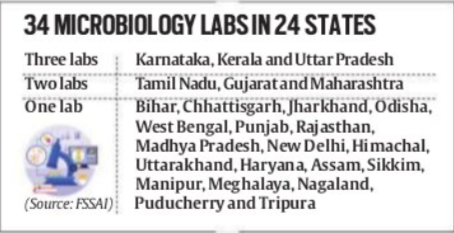Haryana
FSSAI Sets up Lab Network to Test Food for Pathogens
- 20 Mar 2024
- 3 min read
Why in News?
The Food Safety and Standards Authority of India (FSSAI) is working towards creating a network of 34 microbiology labs across the country that will be equipped to test food products for 10 pathogens, including E. coli, salmonella and listeria.
Key Points
- These labs will help test food for microbial contamination that can lead to spoilage of food and potential health risks.
- Data from the National Centre for Disease Control, which tracks the trajectory of several diseases every week, shows that acute diarrhoeal disease and food poisoning were the two most common outbreaks in the country.
- There were over 1,100 outbreaks of acute diarrhoeal disease across the country in the last four years and nearly 550 outbreaks of food poisoning.
- There are 79 state food testing laboratories in the country,none of them are currently equipped to test for pathogens as they require maintaining live reference samples, expensive reagents and a microbiologist.
E. coli
- Escherichia coli, commonly known as E. coli, is a type of bacteria that can be found in the intestines of humans and animals.
- It is a rod-shaped bacterium of the Enterobacteriaceae family.
- Some kinds of E. coli can cause diarrhea, while others cause urinary tract infections, respiratory illness and pneumonia, and other illnesses.
- Pathogenic E. coli can be transmitted to humans through contaminated food, water, or contact with fecal matter from infected individuals or animals.
Salmonella
- It is a group of bacteria that can cause food-borne illnesses known as salmonellosis.
- Salmonella bacteria typically live in animal and human intestines and are shed through feces. Humans become infected most frequently through contaminated water or food.
- The symptoms of Salmonella include nausea, diarrhoea, fever, and abdominal cramps 12-72 hours after contracting the infection.
- WHO has identified Salmonella as one of four key global causes of diarrhoeal diseases.
Listeria
- This bacterium is naturally present in the environment and can be found in the intestines of certain animals, as well as in soil and water.
- It can cause symptoms similar to the flu, making it particularly dangerous for people over 65 and pregnant women.
- It can infect humans through the consumption of unpasteurized milk and dairy products, as well as certain pre-prepared fruits like sliced melons.





